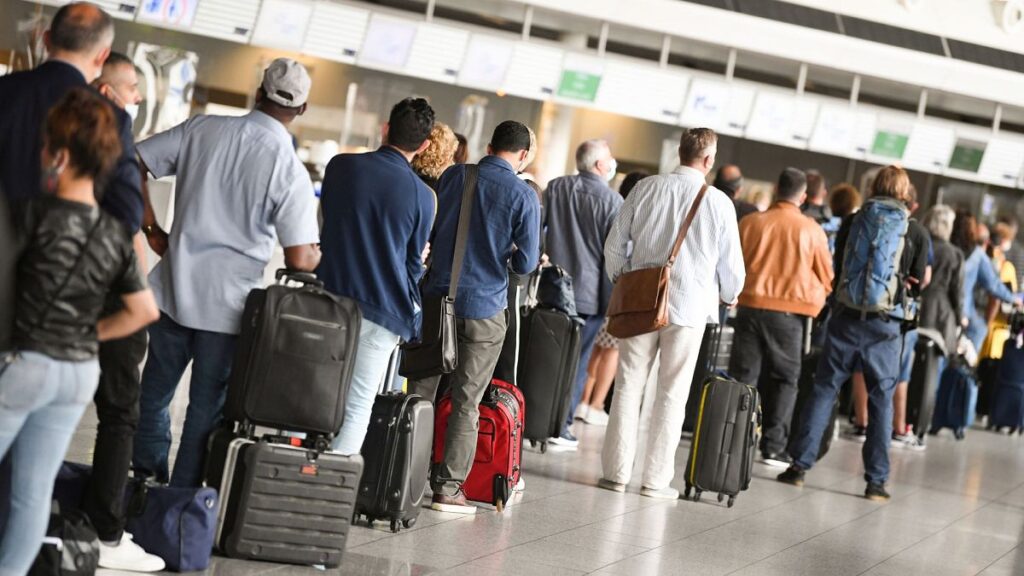From ferry companies to non-flying travel agencies, there has been confusion and scepticism about the new system.
advertisement
After years of delay, the EU's Entry and Exit System (EES) is due to come into force this autumn.
British nationals and other “third country” travellers will have to be photographed and fingerprinted at passport control and register their arrival and departure to EU and Schengen countries – replacing manual stamps in passports.
But many travellers remain uncertain about how the system, and the European Travel Information and Authorisation System (ETIAS), due to be introduced in mid-2025, will work.
EuronewsTravel spoke to travel organisations, travel agents and experts to find out what advice they are giving to their clients ahead of the planned launch.
Travel agents faced with uncertainty over EES start date
Many major travel agencies told EuronewsTravel that they had not yet received any questions or official guidance on the EES regime.
However, travel industry body ABTA has already published tips and advice for planning and booking holidays under the new system.
Despite reports that the scheme is due to come into force on 5 October 2024, an ABTA spokesperson stressed that the exact start dates for EES and ETIAS have yet to be confirmed.
The uncertainty has caused skepticism among some travel agents.
“We're not offering any advice because we're waiting to see whether this plan actually goes ahead,” said Noel Josephides, chairman of British travel agent Sunville.
Perhaps due to low public awareness, Sanville says he has received only one comment about the scheme from a customer who was “fed up” with the restrictions and “will never travel to Europe again.”
Will the EES put travellers off travelling to Europe?
“The more bureaucracy there is, the worse the freedom to travel,” said Josephides, agreeing that a system like the EES would likely discourage people from traveling to Europe.
He pointed to the delayed launch due to the Olympics as evidence that the system is expected to cause confusion for travelers.
“Any time it is introduced, it will have a negative impact on tourism and complicate travel, otherwise France would have accepted it before the Olympics this summer.”
He's not the only one concerned about the EES's impact on travelers.
In April P&O Ferries raised concerns about the implementation of the plan in the port of Dover.
“The EES process was designed for pedestrian traffic passing through airports and is fundamentally unsuited to a port environment,” the company's European director, Jack Steer, wrote in a letter to UK Parliament.
He said the current port layout makes it impossible to handle separate passenger and cargo traffic and that “serious disruptions” would be inevitable.
How will EES affect ferries?
EES checks for air travellers are normally completed when they arrive at their destination, but for ferries from Dover and international trains, checks take place as they go through passport control in the UK, ABTA explains, because there is a double border between the UK and France at these locations.
advertisement
Concerns about delays at the port are likely a factor in the latest delayed launch, which will allow the Port of Dover time to install a new processing system for cars and buses, including installing kiosks and waiting areas outside the port itself to reduce queues at the border.
An app to speed up the registration process is not expected to be ready until the fall, so travel delays are still likely.
“While the EES is an EU initiative, the UK Government is working closely with the European Commission, its Member States, UK local authorities and industry to minimise disruption to people's travel plans,” a spokesperson for the UK Department for Transport (DfT) told EuronewsTravel.
“This includes working closely with ports, transport operators and the travel industry to ensure they are supported and prepared to communicate any changes and the impact this may have on people's travel.”
How will ESS affect international trains?
Eurostar is expanding its London base at St Pancras station to install more kiosks to process EES data.
advertisement
Rail passengers are already wondering how the EES will affect their travel, as train tickets are often cheaper when bought in advance.
Non-flight travel company Byway is already fielding questions from customers about when the scheme will be implemented, whether a visa is required and what documents will be needed.
“Non-flying travel can feel pretty complicated to plan on your own,” says Byway CEO and founder Cat Jones. “Many of these systems tend to be built with air travel in mind, and it can be hard to find information specific to rail travel.”
One customer has already said they will be booking with the company again for help navigating the new system.
Due to a lack of awareness among British nationals about how the EES and ETIAS work, many are likely to rely on travel agents to guide them when the systems finally come into force.
advertisement
Source link



